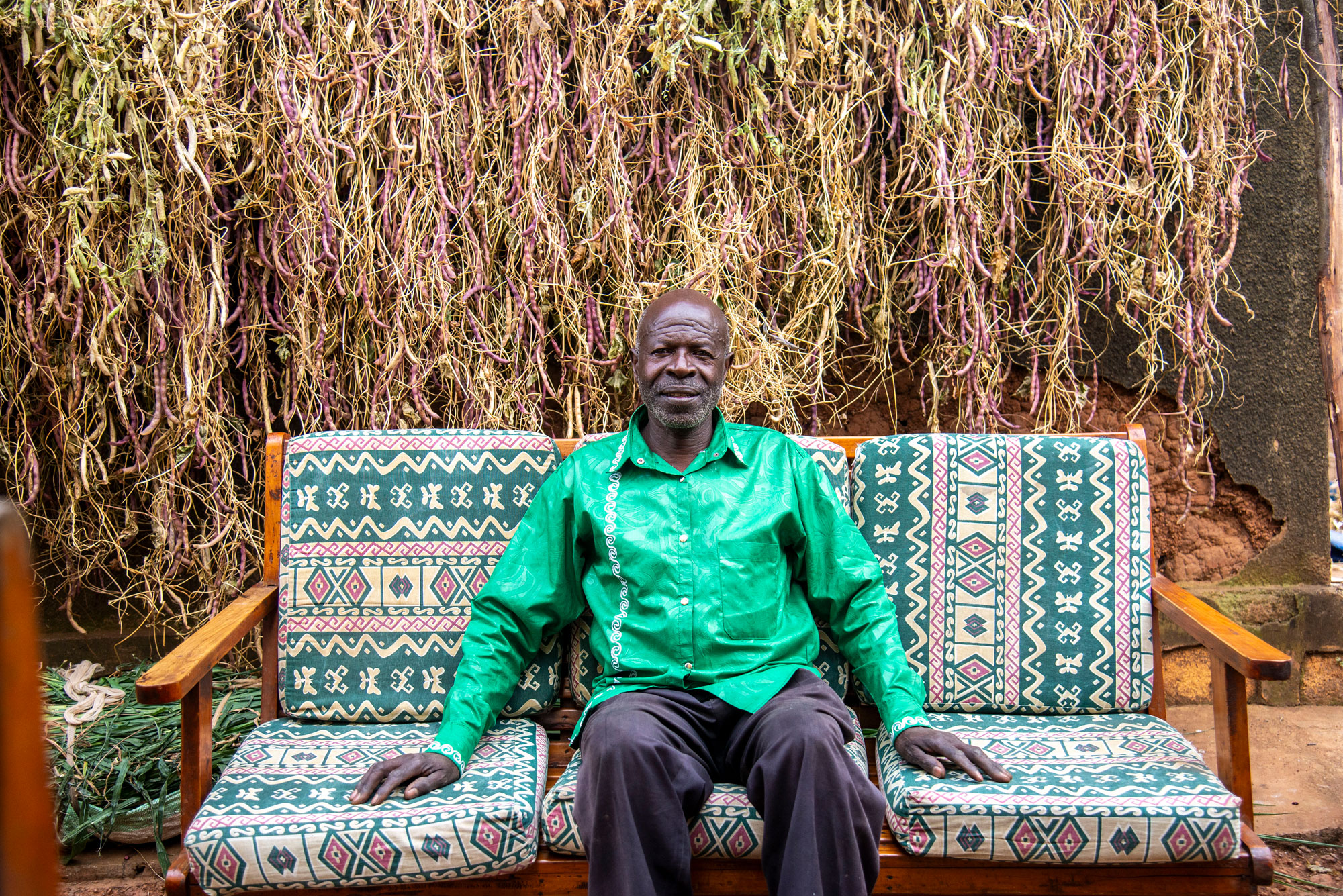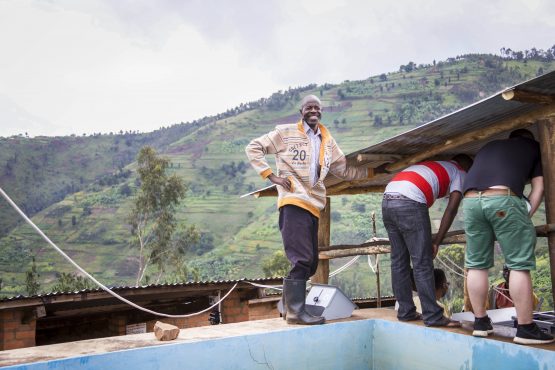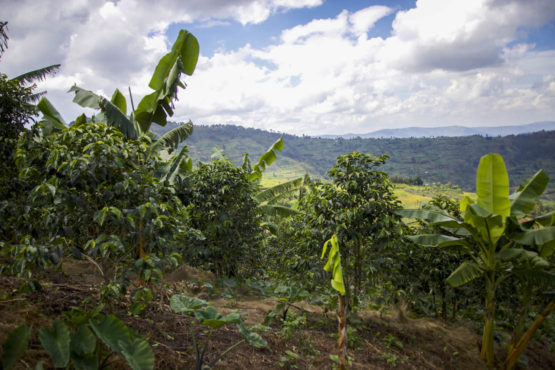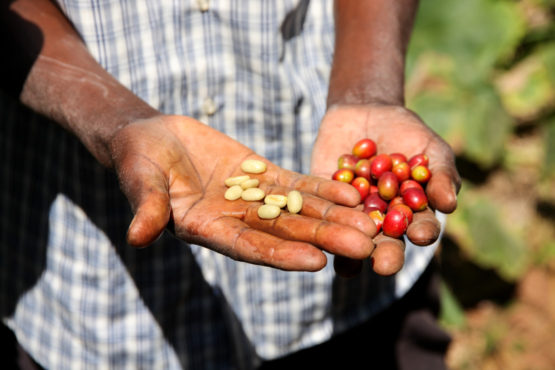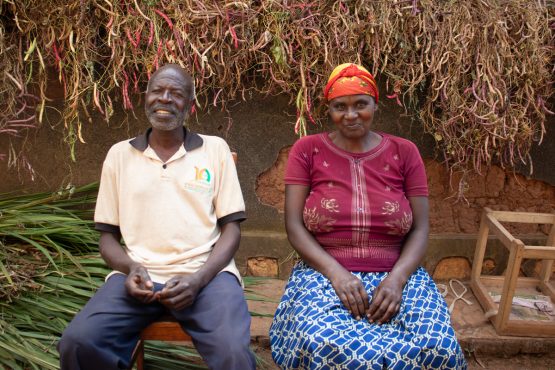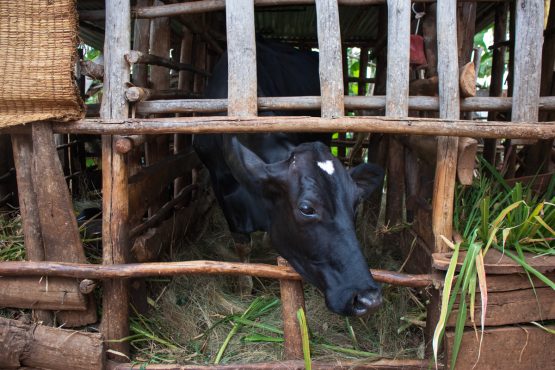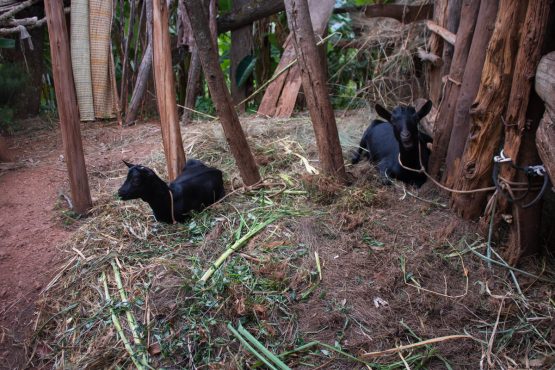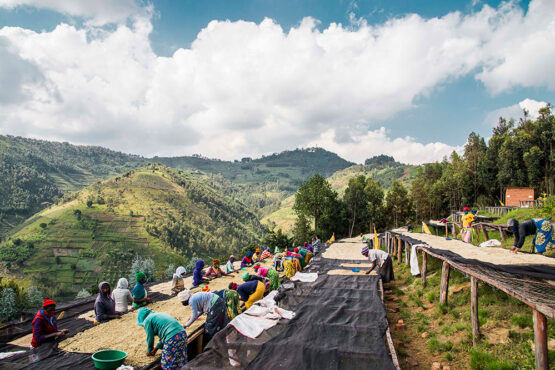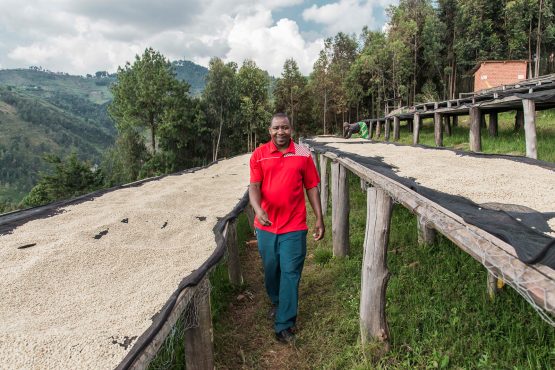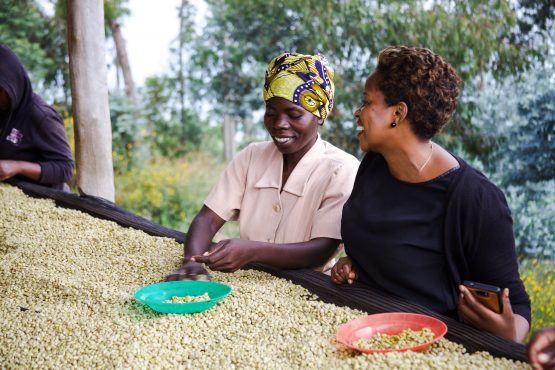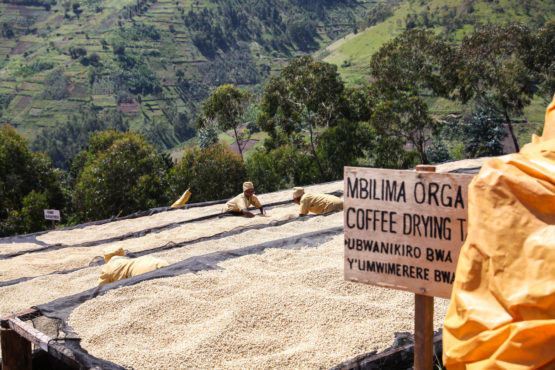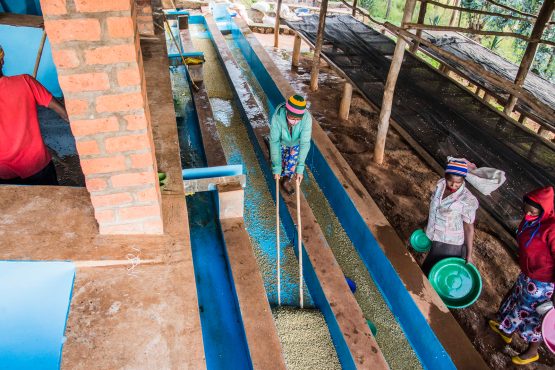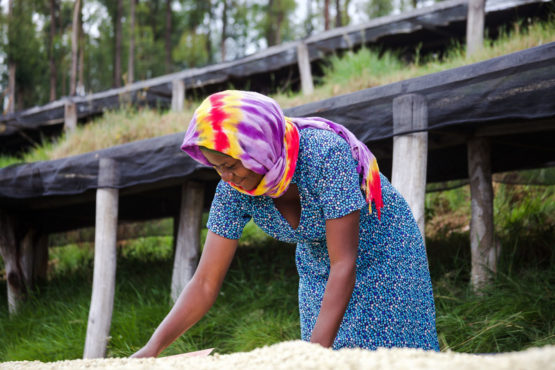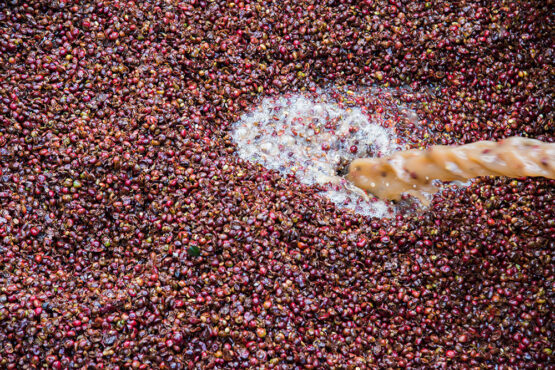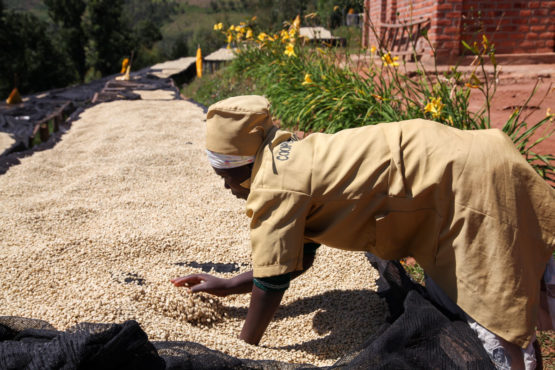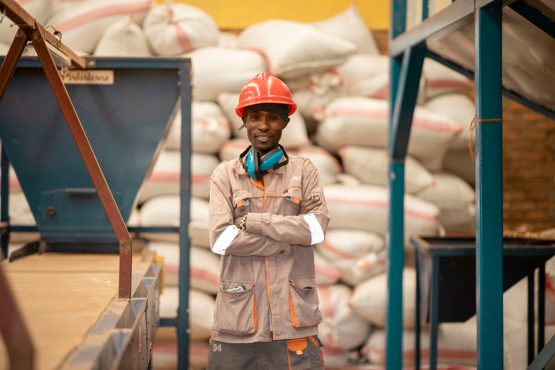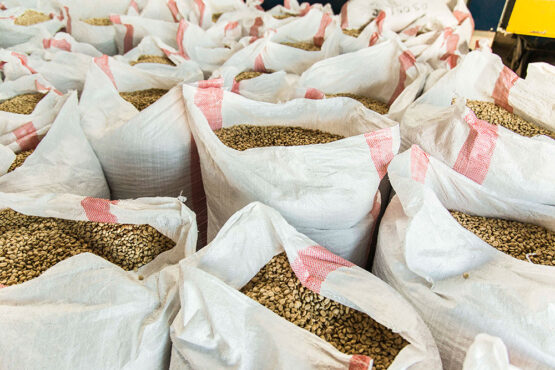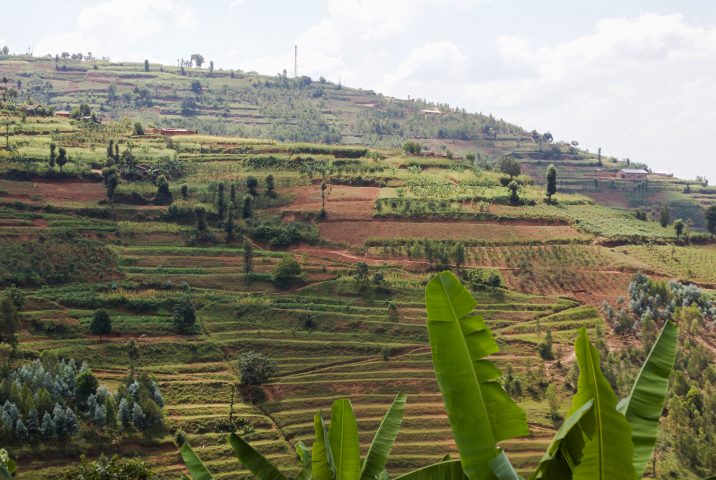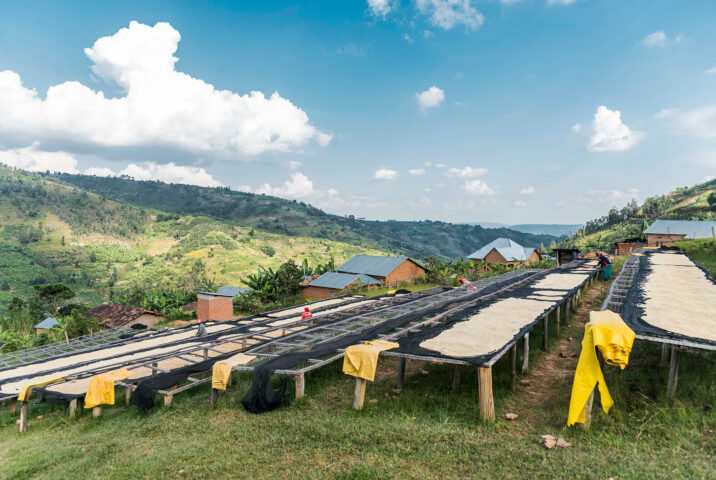Andre Hakizimana Organic
Sweet and well balanced, with redcurrant acidity, toffee apple, and maple syrup sweetness.
It is very rare to be able to get a coffee that is traceable back to a single farm in Rwanda, so we feel extremely fortunate to be able to share this special microlot from producers Andre Hakizimana and Anathal Mukagwiza.
Most of the coffees we source from Rwanda are traceable back to a washing station, or sometimes a farmer group. Typically, washing stations in Rwanda receive cherry from hundreds (and sometimes thousands) of farmers who own very small plots of land – on average less than a quarter hectare, with just 300-600 coffee trees. Separation of such tiny lots is expensive and impractical, so the large majority of coffees are processed as a mixed lot from multiple producers. Typically, lots are separated as day lots (ie. cherries that were all picked on the same day) rather than by a single farm or producer group.
Single farm microlots like this one are extremely difficult to access. In this case, it is made possible due to the size of Andre and Anathal’s farm, which totals 1.2 hectare. Andre is also a member of the Dukunde Kawa Cooperative, which operates its own dry mill, allowing them to process smaller lots individually, whilst minimising cost and maintaining excellent quality standards.
Andre has worked in coffee for over 40 years. He is one of the founding members of Dukunde Kawa Cooperative and remains active in the cooperative – he even works at Dukunde Kawa’s washing stations in the off-season, undertaking maintenance and improvements outside of the harvest period. His career in coffee started at an early age, when he left school at fifteen and began working the fields with his father. He eventually inherited a plot of land, which he planted with coffee.
Andre is an industrious coffee farmer and, over time, he saved money and acquired more land to plant more trees. These efforts were, in part, to meet the needs of his growing family (Andre has five children, two of whom are still in secondary school), and he has used the income earned from coffee farming to pay for school fees, insurance, clothing and covering all the family’s needs.
Before the establishment of cooperatives and centralised washing stations, coffee production was extremely arduous for Rwandan coffee farmers. Processing was labour-intensive and lengthy, with very little equipment, training or resources available to rural farming communities. Coffee cherries were depulped by hand using stones and parchment was dried at farm level, before being sold to a middleman or ‘broker’ who would then on sell the coffee to traders or exporters based in Kigali. Not only did this result in a long and challenging harvest season for individual farmers, it also denied them any leverage for negotiating prices to achieve a fair and reliable income.
With the forming of cooperatives like Dukunde Kawa, farmers were able to access the support, education and resources necessary to adopt better farming practices, and processing moved to centralised washing stations – where shared infrastructure, equipment and adequate labour both minimised the workload for individuals and dramatically improved the coffee’s quality. Andre was an early joiner of Dukunde Kawa (he is member #26!) and has transformed his life since joining the cooperative. As he shared on a recent visit to his farm, “[Thanks to] the way Dukunde Kawa has processed and marketed our production, the price has improved significantly. The cooperative pays us regularly, provides us with insurance and bonuses, and even with cows. Now there is a lot less work to do, and only during the harvest, because Dukunde Kawa does the rest.”
Today, Andre and wife, Anathal Mukawiza, own over 3,000 coffee trees and produce around seventy tonnes of coffee per season, making them one of Dukunde Kawa’s largest producing members. Their production has grown so much that Andre now employs between five to eight workers during the harvest to help him with picking. The pickers are trained to select only the ripest cherries for harvest and do several passes throughout the season to ensure quality standards are met. Andre hopes to increase his arable land year on year and add more trees, to ensure annual production remains stable, even if a plot or two drops volume due to unforeseen circumstances or climate events.
Coffee is at the centre of Andre’s life. Located at high elevations in a uniquely cool and humid microclimate, the farm experiences perennial rainfall, meaning there is cherry on the trees that must be harvested and processed year-round. Mbilima washing station only operates and receives cherry from October through to March — outside of those times, the must couple sell their cherry to a local broker who processes at a small scale and sells parchment to the local market. The Rwandan government prohibits the installation of wet mills at farm levels to discourage farmers from processing at home (and potentially lowering the overall quality of Rwandan coffee), so the pulping is done by hand using stones.
Like all farmers who deliver to Mbilima, Andre farms 100% organically. He uses manure from his farm animals to fertilise his trees and has planted pumpkins and banana trees to prevent erosion and keep the soil moist. Anathal works closely with him on the farm and the couple take great pride in their work and their coffee, which they see as an important investment in their family’s future. He hopes his children will follow in his footsteps, and has recently gifted 50 coffee trees to each of his four children who are still studying and a plot of land with 150 trees to his married daughter. After living on the property for nearly 40 years, the pair plan to renovate their house in the coming years, using the income generated from coffee sales to pay for it.
When we asked Andre what makes him proudest about working in coffee, he shared: “[The fact] that I have my own home, I have managed to buy a motorbike… I live off my own work.” The motorbike helps Hakizimana in his role as dairy and site collector for Dukunde Kawa. By taking on this extra work, Andre helps his neighbours deliver cherry to Mbilima washing station and their milk to Ruli, where it is processed at Dukunde Kawa’s plant. Whilst Andre uses his own resources to transport the produce, he also receives an extra premium from the co-op, to compensate and reward his efforts.
Unfortunately, during the 2023 season, localised hail storms damaged his production extensively. Recovering from hailstorms is not straightforward, as many of the trees must be extensively pruned to remove damage, and require extra nutrition in the year that follows. The goal is to remove any unnecessary stress the plants may endure in the recovery, so that they can go back to being productive as early as possible. While this setback has been disappointing, Andre remains confident it won’t have longterm effects at his farm. As he exclaimed, “Even though hailstorms have affected us, we are going to push forward and put all our efforts so you can keep finding our production. What we ask is that you keep buying it — and we will show you that we will not lose good quantities for you!’”
ABOUT MBILIMA WASHING STATION
At a staggering elevation of 2,020 metres above sea level, Mbilima is one of Rwanda’s highest washing stations. The area surrounding the washing station has mineral-rich soil and a lush environment that is well suited to specialty coffee production. Typically, farms in this area are very small – averaging just a quarter of a hectare – and are situated between 1,800 to 2,100 meters above sea level.
The washing station was established in 2005 and services 874 growers (643 men, 231 women) who live and grow coffee locally. Four permanent staff and 49 seasonal workers are employed by the washing station – most of whom are women.
Day-to-day operations at Mbilima are overseen by John Bosco Habimana, who has been the washing station’s manager since 2014, and QC is headed by Agnes Mushimiyimana. The washing station is 100% organic, Rainforest Alliance certified, UTZ certified, and Fair Trade certified. John Bosco explained that becoming certified was extremely useful in formalising and documenting a lot of things that the cooperative was already doing. “It helped us to better the lives of our producers and quality of our coffee. It’ was a lot of work to get the certifications,” he explained, “but it also made us realise how many positive things we were already doing. The certifications reinforce this.” Because all lots processed at Mbilima are organic, they are dry milled and stored separately.
While the site received organic certification in 2018, the lengthy process began in 2015. Dukunde Kawa wanted to operate one of their washing stations using organic practices and, after consulting with local farmers, they decided on Mbilima. The transition required a lot of work and created challenges for farmers, who initially experienced decreased yields after they stopped using synthetic fertilisers. After a couple of years, however, they began to realise that while volumes stayed the same, their trees were significantly healthier after the harvest (whereas under synthetic fertilisation, they would wither and “dry up” after cherry was picked) — leading to greater stability in the crop produced.
Like Andre, many farmers who deliver to Mbilima are now firm believers in the benefits of organic production and certification. Certification is free for the producer, with Dukunde Kawa covering all costs associated with the program (including surveyors who inspect participating farms on regular intervals), and offering an additional premium at the same time as the standard second payment. By committing to the program, farmers must cease all use of synthetic fertiliser — not just from coffee plots, but from the entire farm — a transition that Dukunde Kawa supports by sending trainers to the farms and providing further education. Since the co-op first launched the initiative, the number of enrolled producers has grown by nearly 25% — proof that in the long run, the benefits outweigh the initial difficulties experienced.
Head here to learn more about the work of Dukunde Kawa in Rwanda.
PROCESSING AT MBILIMA WASHING STATION
The team at Dukunde Kawa takes a huge amount of care in processing its coffee. All members of the cooperative are trained to only select ripe coffee cherries from their trees.
- On delivery, the cherries are inspected and sorted by hand to ensure only the very ripest cherries are processed. Farmers do the selecting, and receive the highest income from the ripest, healthier fruit. The remainder of their crop still gets purchased by the co-op, at a lower price, to be processed and sold for the internal market.
- Cherry is then sorted by weight (and any floaters are removed) by a Pinhalense machine that the washing station staff affectionately have named the ‘Umupolisi’ (police person). By using a machine, rather than a clerk, Dukunde Kawa are more transparent with contributing growers about which fruit gets processed. Coffee is then pulped on the same day – usually in the evening – using a mechanical pulper that divides the beans into three grades by weight, with the heaviest, A1, usually having the highest cup quality.
- After pulping, the coffee is pre-washed and fermented overnight for around 12–18 hours and then graded again using floatation channels that sort the coffee by weight. The wet parchment is the washed a second time and left to ferment for a further six hours — with the goal of removing as much mucilage as possible without using machinery that may accidentally crush or damage the beans.
Coffee cherries being soaked at Mbilima Washing Station Isobelle Mujawamalita, carefully sorting coffee drying in the sun at Mbilima washing station
- As with most washing stations in Rwanda, women do the majority of hand-sorting. This takes place in two stages – on the covered pre-drying tables and on the drying tables. Washed beans are moved from the wet fermentation tanks onto the pre-drying tables, where they are intensively ‘wet sorted’ under shade for four hours. The idea is that greens (unripe beans) are still visible when the beans are damp, while the roofs over the tables protect the beans from the direct sunlight.
- Next, the beans are moved onto the washing station’s extensive raised drying tables (‘African beds’) for around two weeks, where they are sorted again for defects, turned regularly and protected from rain and the midday sun by covers, ensuring both even drying and the removal of any damaged or defective beans. During this period the coffee is also turned several times a day by hand to ensure the coffee dries evenly and consistently.
- After reaching 11-12% humidity, the coffee is then transported to Dukunde Kawa’s purpose-built warehouse prior to final dry-milling and hand sorting at the cooperative’s dry mill.
- Located in Ruli, Dukunde Kawa’s dry mill has the capacity to process one full container of coffee a day — and combines the use of technology with meticulous hand sorting to ensure only the best beans are bagged. Before being loaded for export, Rwanda’s National Agricultural Export Development Board also inspects and samples the prepped parchment.
Jean Bosco Mugiraneza manages operations at Dukunde Kawa’s dry mill in Ruli. Coffee parchment being weighed and stored at Ruli’s onsite dry mill
WHY WE LOVE IT
We have known Andre for many years, and first visited his farm in 2014. In 2017 we were finally able to buy his coffee as a separate lot and have committed to purchasing his coffee every year since. We love this year’s coffee for its maple syrup sweetness and its redcurrant acidity.
